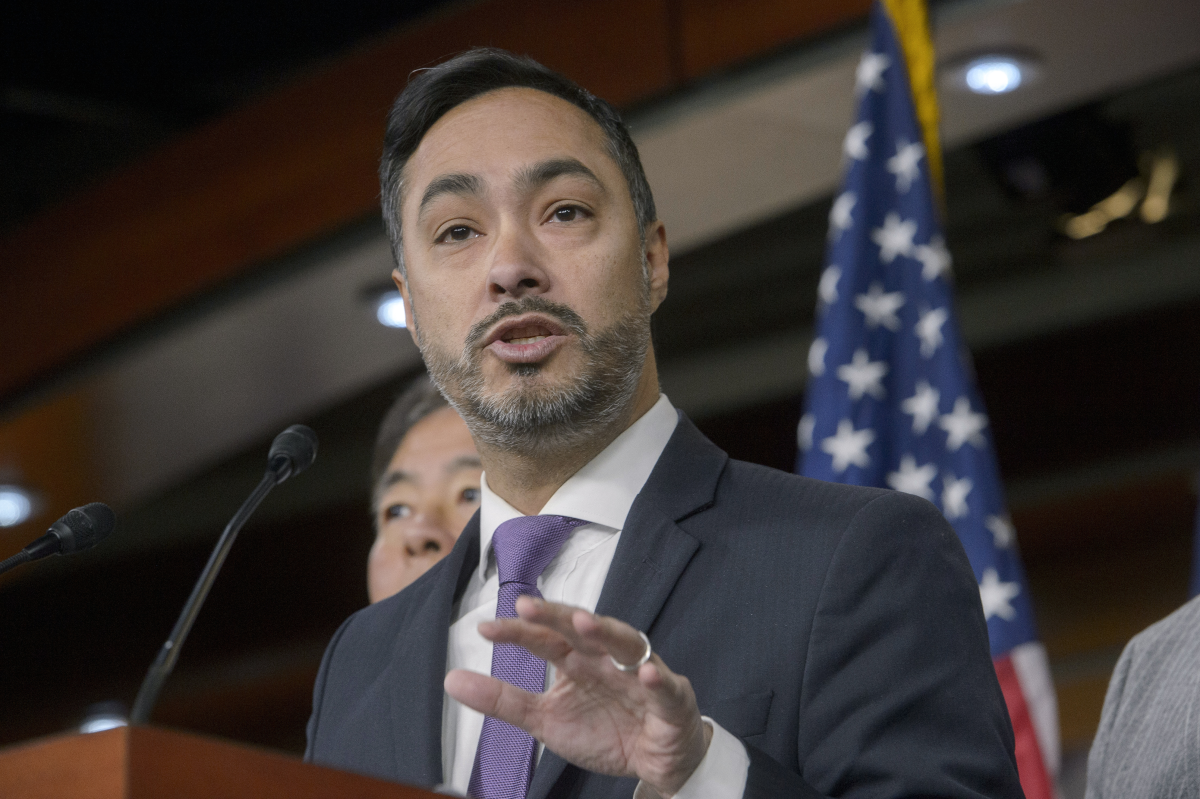Texas lawmaker wants investigation into weather alert system and storm preparedness
As the death toll rises following catastrophic floods in Central Texas over the holiday weekend, Rep. Joaquin Castro, D-Texas, says officials owe a thorough investigation to find out what went wrong in warning and evacuating residents.
Flash flooding in Texas killed at least 90 people over the Fourth of July weekend, with most reported in Kerr County, about two hours northwest of San Antonio.
Many people in the county live along the Guadalupe River, which rose over 26 feet in 45 minutes early Friday morning when heavy storms started. In the days since, local officials have grappled with tough questions about why people who live along the river were not warned to evacuate.
The National Weather Service (NWS) warned of possible heavy showers on Wednesday and upgraded Thursday to a flood watch, which is when conditions make flooding possible. A flash flood warning, meaning flooding is imminent or happening, wasn’t declared until early Friday morning, after nearly a foot of rain had already fallen.
In an interview with Morning Edition, Castro said it’s imperative that the NWS be well-staffed and ready to work with local and state agencies in the face of climate change, particularly during emergencies like the one in Central Texas when flash flooding occurred quickly.
“I think we all owe that to the community there. And also, I think we owe that to the people of this country going forward to make sure that we do everything we can to prevent something like this from happening again,” Castro said. Earlier this year, the NWS lost almost 600 workers after the Trump administration ordered cuts, which some critics warned would affect emergency preparedness. The agency recently began rehiring after public backlash about staffing cuts.
The local Austin/San Antonio NWS forecast office listed at least six vacancies in recent days.
On Monday, White House press secretary Karoline Leavitt dismissed criticism that the federal response to the floods in Texas has been inadequate due in part to funding cuts.
“Blaming President Trump for these floods is a depraved lie, and it serves no purpose during this time of national mourning,” she said.
Castro’s district, the western half of San Antonio and Bexar County, is still recovering from flash floods last month that killed 13 people. From his experience, he says Kerr County will need state, federal and private support to recover from the floods
Castro spoke to NPR’s Leila Fadel about the floods and the lingering questions about the federal and state response.
The following excerpt has been edited for length and clarity.
Leila Fadel: Just as they did in San Antonio last month, hundreds of first responders have conducted water rescues, they’re saving people who are stranded in trees and stuck in swamped vehicles. Are there enough local resources available to recover from disasters like this?
Rep. Joaquin Castro: Kerr County is not the size of Bexar County where San Antonio is or Harris County like Houston. And so the tax base there is much more limited. It’s a smaller community. So it’s going to be important that both state and federal governments are very helpful and supportive with resources, with money for the community to rebuild, to look at alarm systems, to prevent this from happening again, to look at flood mitigation efforts as well.
It’s tragic in both cases. Both cases in San Antonio and in Kerr County were very different. In Kerr County, you had a situation where the river rose and you had structures and housing along the river. In San Antonio, it was a very urban situation where people were basically trapped in their vehicles with rising water in a flash flood very quickly. But it really speaks to the importance of having the resources, including the National Weather Service, to be able to warn people very quickly and move very quickly to combat flash flooding.

Fadel: One of the big questions being posed to local officials, to state officials and to the White House is why people weren’t warned earlier. Some of your colleagues in the Senate sent a letter to the president and the secretary of commerce last month, alarmed over the staff reductions at the National Weather Service and what that could mean for emergency preparedness. In your view, did these cuts play a role in preparations and warnings here?
Castro: I think it’s too early to know whether in this particular instance it did, but I think there should be a full investigation, not just of any kind of federal failures, but also state and local, obviously. I think we all owe that to the community there. And also, I think we owe that to the people of this country going forward to make sure that we do everything we can to prevent something like this from happening again.
But I think it also speaks to the importance of the National Weather Service, that you have a full and robust staff that can work with state and local agencies to warn people. Because you’re dealing with just a short period of time, with a flash flood, where you’ve got to get the message out to people right away. That means you need the personnel in place, you need the local government helping to warn people, and then you need a way to help people evacuate very quickly. And right now we still have a rescue effort going on, and finding the rest of those people alive, hopefully, is a priority. But after that, in the months to come, I think we owe it to everybody to make sure that there’s a thorough investigation of what went wrong.
Fadel: As you know, we’re beginning to experience heavier and more extreme rainfalls. What most needs to happen now to try to prevent future loss of life in these weather emergencies?
Castro: We need a strong National Weather Service. We need to strengthen the working relationship between the National Weather Service and state and local governments. We need to improve the warning systems, obviously. And, I know that for many years now, the idea of climate change has become a political one, it’s become a very political debate. But these events that were supposed to be a one in a 100 year event or one in a 500 year event have been happening more often. So we have to take that issue seriously and combat it.
This digital article was edited by Obed Manuel. The radio story was edited by Jan Johnson and produced by Vince Pearson.
Transcript:
LEILA FADEL, HOST:
To understand what Kerrville County needs in the face of this tragedy, we turn now to Democratic Congressman Joaquin Castro. His district is still recovering from flash flooding last month in San Antonio that took 13 lives. Now, some 100 miles away, more lives were swept away when storms dumped rain and caused this flash flooding, as we heard. And Congressman Castro knows about the desperation in the face of tragedy like this from experience. Congressman, thank you for joining us at this difficult time.
JOAQUIN CASTRO: It’s good to be with you. You know, it’s been an absolute tragedy for San Antonio a few weeks ago because we lost 13 people to…
FADEL: Yeah.
CASTRO: …Flash floods, and now for the people of Kerr County to lose so many people in one terrible event like this.
FADEL: You know, looking at this, I know that your district is still recovering from the flash floods last month and now this tragedy. What do you know about what Kerrville County will need most right now?
CASTRO: Well, a lot of support from local, state and federal government. And, of course, all of the donations. And it’s been amazing to see just the level of support that’s come from people really all over the world for Kerr County and the people who are suffering there. And so I know that they had posted about exactly what they need, but it’s going to take the community a long time to recover there.
FADEL: You know, just as they did in San Antonio last month, hundreds of first responders have conducted water rescues. They’re saving people who are stranded in trees and stuck in swamped vehicles. Are there enough local resources available to recover from disasters like this?
CASTRO: You know, Kerr County is not the size of Bexar County, where San Antonio is, or Harris County, like Houston. And so the tax base there is much more limited. It’s a smaller community. So especially in places like that, that’s where you need to lean on the resources of a state government and a federal government. So it’s going to be important that both state and federal governments are very helpful and supportive with resources, with money for the community to rebuild, to look at alarm systems to prevent this from happening again, to look at flood mitigation efforts as well. It’s tragic in both cases. In both cases, in San Antonio and in Kerr County were very different. In Kerr County, you had a situation where the river rose and you had structures, housing along the river. In San Antonio, it was a very urban situation where people were basically trapped in their vehicles with rising water in a flash flood very quickly. But it really speaks to the importance of having the resources, including the National Weather Service, to be able to warn people very quickly and move very quickly to combat flash flooding.
FADEL: One of the big questions being posed to local officials, to state officials and to the White House is why people weren’t warned earlier. Some of your colleagues in the Senate sent a letter to the president and the secretary of commerce last month, alarmed over the staff reductions at the National Weather Service and what that could mean for emergency preparedness. In your view, did these cuts play a role in preparations and warnings here?
CASTRO: I mean, I think it’s too early to know whether in this particular instance it did, but I think there should be a full investigation, not just of any kind of federal failures, but also state and local, obviously. I think – you know, I think you owe that. We all owe that to the community there. And also I think we owe that to the people of this country, going forward, to make sure that we do everything we can to prevent something like this from happening again. But I think it also speaks to the importance of the National Weather Service that you have a full and robust staff that can work with state and local agencies to warn people because most of all, you see that you’re dealing with just a short period of time with a flash flood, where you got to get the message out to people right away. That means you need the personnel in place. You need the local governments helping to warn people, and then you need a way to help people evacuate very quickly. And, you know, right now, we still have a rescue effort going on, and finding the rest of those people alive, hopefully, is a priority. But, you know, after that, in the months to come, I think we owe it to everybody to make sure that there’s a thorough investigation of what went wrong.
FADEL: President Trump last night said he would sign a disaster declaration for the flood zone. What will the federal support do?
CASTRO: Well, I think it’ll be a lifeline, again, for a small community that, on its own, doesn’t have a huge tax base. And so that’s where you need a federal government to lean in and to be helpful. And so hopefully, there will be that alarm system put in place. There’ll be flood mitigation efforts for the future. You know, there will be, obviously, help with items that the community needs and the families need that have been affected. So that federal help is going to be incredibly important.
FADEL: You know, I know, Congressman, that this wasn’t in your district, but this tragedy seems very far-reaching. I mean, I know my sister’s a teacher. There were parents at her school looking for their child. I mean, how far-reaching has been – this tragedy been across Texas and really across the country?
CASTRO: Yeah. I mean, you know, the Guadalupe River and the area there around Hunt, Texas, and in Kerr County, it’s a popular place for people to go to camp from different parts of Texas, different parts of the country. And – but people also, you have people who have homes there, vacation homes, some of them, folks that go camping there. Remember, this was around the Fourth of July. And so it has been incredibly, incredibly wide-ranging in terms of the people who were affected and where they’re from.
FADEL: As you know, we’re beginning to experience heavier and more extreme rainfalls. I mean, what most needs to happen now to try to prevent future loss of life in these weather emergencies?
CASTRO: We need a strong National Weather Service. We need to strengthen the working relationship between the National Weather Service and state and local governments. We need to improve the warning systems, obviously. And, you know, I know that for many years now, the idea of climate change has become a political one. It’s become a very political debate. But these events that were supposed to be a one-in-100-year event or one-in-500-year event have been happening more often, and, you know, so we have to take that issue seriously and combat it.
FADEL: Democratic Congressman Joaquin Castro of Texas, thank you for your time.
CASTRO: Thank you.
(SOUNDBITE OF KUPLA’S “ENDURANCE”)
Judge rules 7-foot center Charles Bediako is no longer eligible to play for Alabama
Bediako was playing under a temporary restraining order that allowed the former NBA G League player to join Alabama in the middle of the season despite questions regarding his collegiate eligibility.
American Ben Ogden wins silver, breaking 50 year medal drought for U.S. men’s cross-country skiing
Ben Ogden of Vermont skied powerfully, finishing just behind Johannes Hoesflot Klaebo of Norway. It was the first Olympic medal for a U.S. men's cross-country skier since 1976.
An ape, a tea party — and the ability to imagine
The ability to imagine — to play pretend — has long been thought to be unique to humans. A new study suggests one of our closest living relatives can do it too.
How much power does the Fed chair really have?
On paper, the Fed chair is just one vote among many. In practice, the job carries far more influence. We analyze what gives the Fed chair power.
This complex brain network may explain many of Parkinson’s stranger symptoms
Parkinson's disease appears to disrupt a brain network involved in everything from movement to memory.
‘Please inform your friends’: The quest to make weather warnings universal
People in poor countries often get little or no warning about floods, storms and other deadly weather. Local efforts are changing that, and saving lives.








